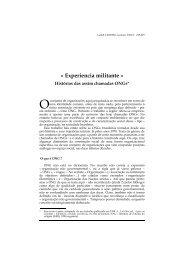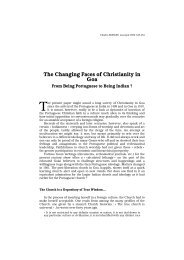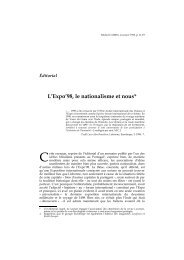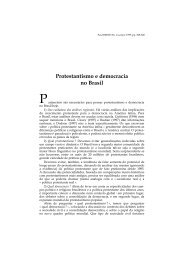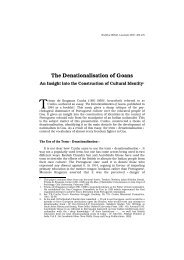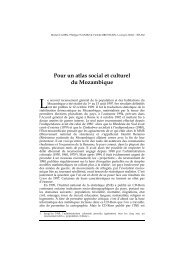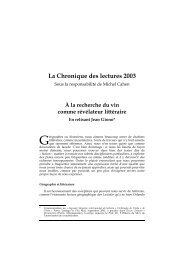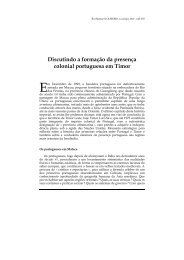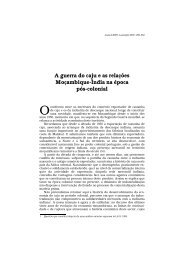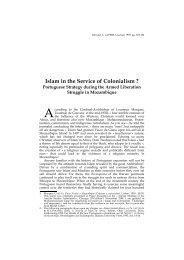some contrasting visions of luso-tropicalism in india - Lusotopie
some contrasting visions of luso-tropicalism in india - Lusotopie
some contrasting visions of luso-tropicalism in india - Lusotopie
Create successful ePaper yourself
Turn your PDF publications into a flip-book with our unique Google optimized e-Paper software.
SOME CONTRASTING VISIONS OF LUSO-TROPICALISM IN INDIA 383African colonies. The creation <strong>of</strong> CPLP <strong>in</strong> July <strong>of</strong> 1996 is one such <strong>in</strong>stance<strong>of</strong> rivalry and competition. More may be <strong>in</strong> the w<strong>in</strong>gs <strong>of</strong> the future 14 .When we hear <strong>of</strong> « lus<strong>of</strong>onia » <strong>in</strong> Asia, it is the great economic potential<strong>of</strong> Asia that is under consideration. The attention <strong>of</strong> the West andcapitalism are focused <strong>in</strong> that direction. S<strong>in</strong>ce the 16th century, and s<strong>in</strong>cethe Indies have entered the Portuguese national identity, it is but naturalthat Portugal should seek to capitalise on the forthcom<strong>in</strong>g comemorations<strong>of</strong> Vasco da Gama’s voyage to India five hundred years ago. The Expo-98 <strong>in</strong>Lisbon is expected to be a big show. In the diplomatic area Portugal alreadyhas a Consulate General <strong>in</strong> Goa, and more are likely to be created <strong>in</strong> he nearfuture <strong>in</strong> S<strong>in</strong>gapore, Macau and the Philipp<strong>in</strong>es. It is important, however,that this diplomatic-commercial drive does not imply a return to amentality <strong>of</strong> little regard for the Asian cultures. If « lus<strong>of</strong>onia » has hadlittle success <strong>in</strong> Asia, it cannot be expla<strong>in</strong>ed as be<strong>in</strong>g due only to the limitednumbers <strong>of</strong> the metropolitan Portuguese who went thither, never exceed<strong>in</strong>g20,000 at any one stage 15 . With rare exceptions and aborted efforts, such asthe policy <strong>of</strong> miscigenation adopted by Afonso de Albuquerque, thePortuguese were quick to <strong>in</strong>itiate a show <strong>of</strong> force rather than a culturaldialogue <strong>in</strong> the East. Obviously, they did not see an easier alternative topenetrate the commercial network <strong>of</strong> the Indian ocean. The Arabs and theIndians were not prepared to let them have their way so very easily, los<strong>in</strong>gthe benefits <strong>of</strong> the network that they had built up over time. The Portuguesetoo would not behave differently when others sought to challenge theirclaims for monopoly over the Ocean lanes. The so-called « free-trade » («grande soltura ») <strong>of</strong> the Portuguese <strong>in</strong> the Bay <strong>of</strong> Bengal and Southeast Asiaafter the Albuquerquian phase <strong>of</strong> command economy led to the emergence<strong>of</strong> a « shadow empire » 16 and <strong>some</strong> diluted vestiges <strong>of</strong> <strong>luso</strong><strong>tropicalism</strong> <strong>in</strong>Asia may be traced to this development that led many Portuguese to mixmore freely with the natives and cooperate with them at all levels,<strong>in</strong>clud<strong>in</strong>g marriage alliances.The <strong>of</strong>ficial <strong>in</strong>terest <strong>in</strong> Vasco da Gama commemorations <strong>in</strong> Portugalseems to be directed to creat<strong>in</strong>g « jobs for the boys » <strong>of</strong> the rul<strong>in</strong>g party,tak<strong>in</strong>g advantage <strong>of</strong> the generous monetary subsidies <strong>of</strong> the EuropeanUnion. This can be noticed <strong>in</strong> the priorities <strong>of</strong> the Portuguese NationalCommission for Commemorat<strong>in</strong>g Portuguese Discoveries. Much is made <strong>of</strong>mechanically scann<strong>in</strong>g <strong>some</strong> published documentation and present<strong>in</strong>g it <strong>in</strong>CD-Rom. It is a small-scale <strong>in</strong>dustry that provides <strong>some</strong> jobs for low-gradetechnicians. There is hardly any serious <strong>in</strong>terest <strong>in</strong> historical reassessmentthat would admit collaboration <strong>of</strong> Indian or Asian historians with differentor even contradictory ways <strong>of</strong> look<strong>in</strong>g at the past and the « Discoveries ».One lone project <strong>in</strong> this direction, namely that <strong>of</strong> writ<strong>in</strong>g a history <strong>of</strong> thePortuguese <strong>in</strong> India, was ceremoniously scuttled and laid to rest. It wascontrived by gather<strong>in</strong>g expert op<strong>in</strong>ions <strong>of</strong> friendly scholars, <strong>in</strong>clud<strong>in</strong>g areputed Paris-based Indian historian — a way <strong>of</strong> conv<strong>in</strong>c<strong>in</strong>g a naive public14. Política <strong>in</strong>ternacional, I (13), 1996. The whole issue is dedicated to the CPLP.15. S. SUBRAHMANYAM, O império asiático português, 1500-1700, Lisbon, Diffel, 1993, pp. 306-307 ; V. Magalhães God<strong>in</strong>ho, Estrutura da antiga sociedade portuguesa, Lisbon, Arcádia, 1980,pp. 58-69. In the 18t h and 19 th centuries Brasil absorbed the emigration flux <strong>of</strong> Portugal andthe Atlantic islands.16. L.F. THOMAZ, De Ceuta a Timor, Lisbon, Diffel, 1994, pp. 429 sq.



